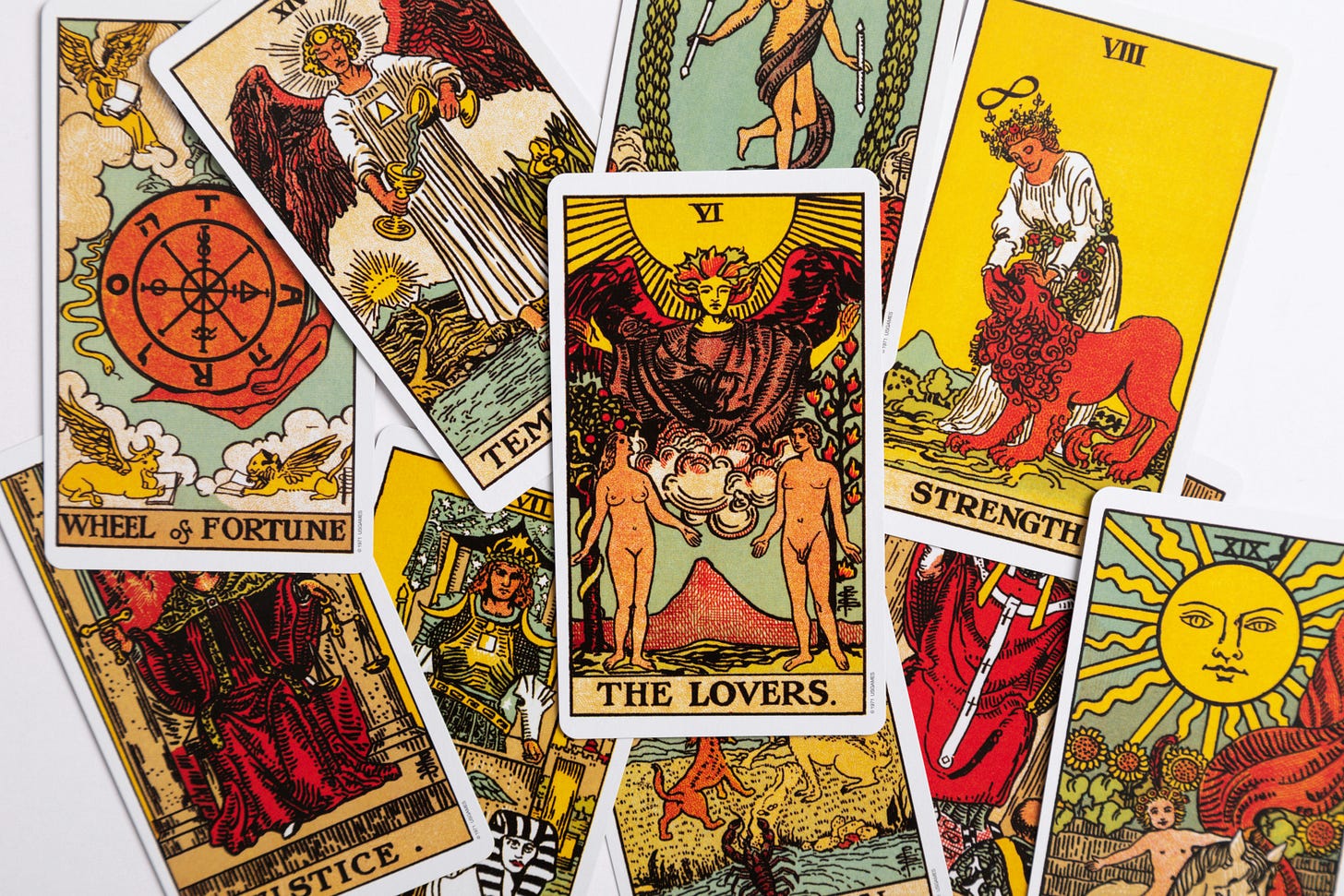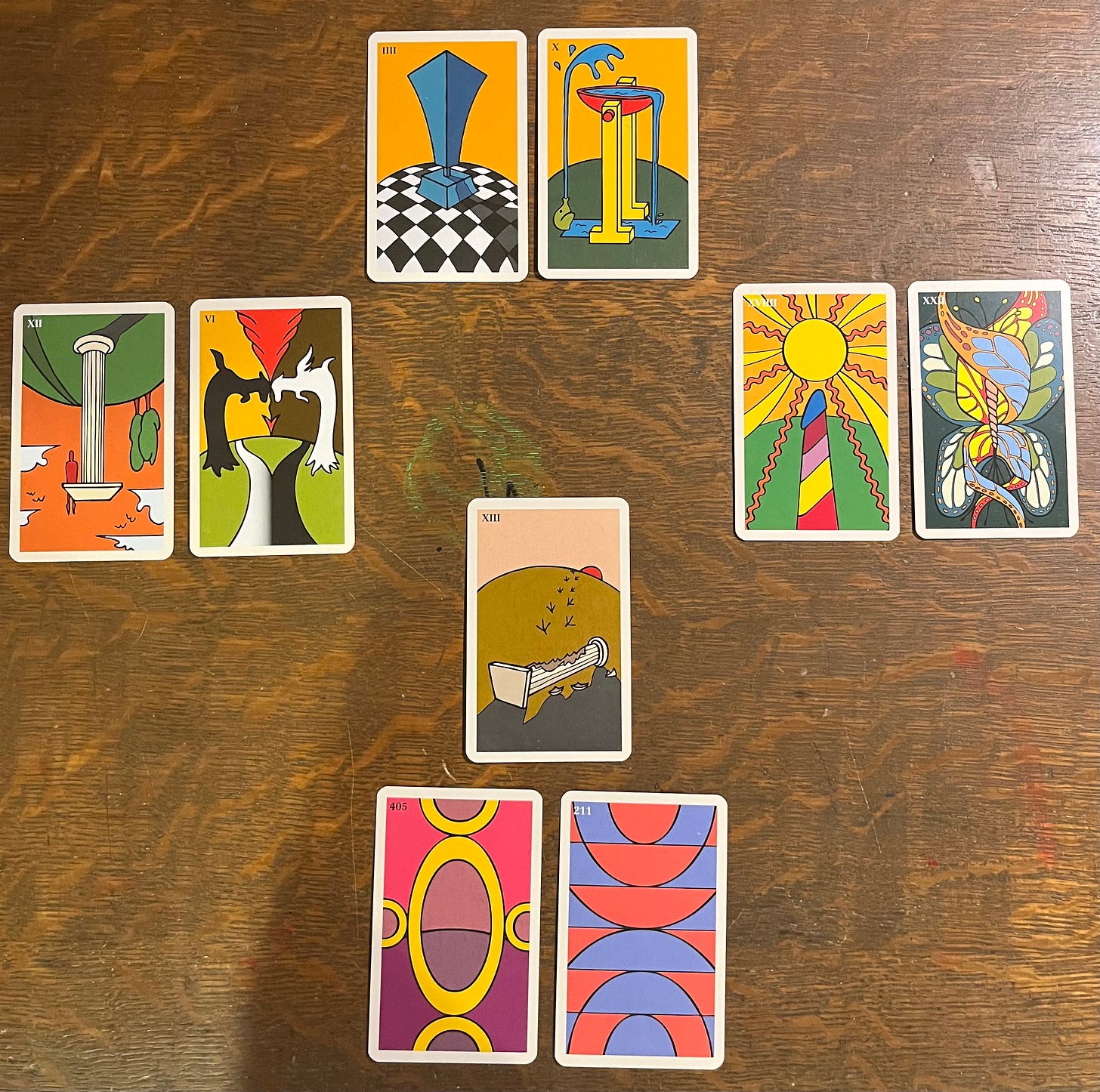
This is a special collaborative edition of Sitting Queerly and focused on examining the shared experiences of queerness and tarot1.
TY: We talked for a while about collaborating on a piece. I’m the one who suggested we make it about tarot, as I knew you practiced it, consistently and thoughtfully.
ARIS: Thanks! I do think both of us use tarot as a means of self-reflection. Of course, our queer identities are often a topic of inquiry as we navigate a world that can be quite hostile to queerness. How do we unpack internalized homophobia and transphobia? What actions can we take to help align us with our authenticity? The tarot allows us to recenter ourselves as we navigate the ever-changing nature of queer desire and expression.
TY: So, during our conversation, something you said immediately grabbed me.
“I feel like my tarot is directly related to my queerness. It’s on the periphery, it’s marginalized.”
This really strikes at the heart of my interest in tarot and its intersection with queerness: its marginalization and even the tendency for its practitioners to be ashamed of it and hide it. And it was why I was so eager for our conversation, to not only weigh on a specific reading but our approaches to tarot and queerness itself.
ARIS: It was exciting to find so many ways our experiences connect while also offering some of my own interpretations. Our lives look quite different from each other. You live on the opposite side of the country with your wife and children. I live with my partner with no ability to have children, and no plans of marriage. Even so, we are both asking questions of ourselves related to navigating queerness in the context of family.
TY: OK, so, most of the exercises I use require the cards to be face up and the deck I use relies on image perception, which is informed by classical tarot interpretations as well as Jungian and Gestalt psychology, to identify your emotions in relation to some question or situation. The overall goal is to identify the emotional state you are in and the one you are seeking and identify tools (mindsets, relationships, etc.) that can help you get there. Reading your feelings in relationship to what is on a card is the easy part. It’s the quality of the question you are asking that largely determines the effectiveness of a reading.
So, I decided to do a Hero’s Journey draw around the question “what do I need to feel more connected to my queerness?” I chose cards from the Major Arcana to represent my current feelings, what I wanted to feel in the future, what my obstacles to that future feeling are and what could help me in relation to that question. I then drew (blind) two cards from the Minor Arcana that could further advise on how to move forward.
The reading I got from this was: I feel stuck and isolated, at loggerheads within. I want to feel confident, be bright and colorful, to complete my transformation but the expectations of others and old patterns/habits/mindsets give me pause. I need to be willing to tear things down and walk away, take that first leap toward a non-tangible ideal. However, I need to recognize that I am still, in a sense, immature when it comes to my queerness and be mindful of the path I take. You had a similar interpretation, more or less.
ARIS: And I had used the tarot to navigate an upsetting family interaction. I wrote a letter to my loved ones about my transition journey and wanted to read it to them at Thanksgiving dinner. My uncle heard of my intentions and asked me not to do so. Some of his reasons made sense, and others came off transphobic and marginalizing. My initial reaction was devastation and intense heartache. I turned to the tarot to figure out how I could still go to dinner with grace, and how I could extend compassion to my uncle even though he had hurt my feelings.
The cards reminded me to think carefully about my goals and take my time. Admittedly, I was less than a week out from having a total hysterectomy and I had written the letter two days before I was planning on reading it. There was medicine in being asked to hold off, even if it hurt. What were my goals in telling my transition story to my family? What reactions was I hoping for, anticipating, and perhaps overlooking? These were important questions the tarot raised for me. So, I’m back to imagining what this process could look like for me, and waiting.
TY: Then you shared how you were pulling the Wheel of Fortune from your deck a lot recently. That’s the same card that one of the cards I pulled is based on, and I had selected it because I perceived it as an obstacle. I associated it with my obstinacy and addiction to comfort, routine and what I know, making it hard to shift gears and do something different when it’s necessary.
But you had a different take:
“For me, the Wheel is about finding your center in the midst of your life.” You added that your own view of the universe is that nothing is predestined or part of some Grand Plan but we also don’t have full control of our destiny.
“It can be a stressful card, it can be hard to wrap your head around. But to me, it means wherever I am right now is where I’m supposed to be.”
I’ve struggled with the present throughout my life. I feel like I always need to be heading somewhere, lest I get dragged down by the past. And while I know I’ve come so far in the last few years, I still have this dread of slipping backward. I feel I need to maintain this constant momentum.
ARIS: I’ve spent a lot of time this year reflecting on the process of waiting. Waiting for a move-in date, waiting for a travel date, waiting for a major surgery. Waiting is an active process, often filled with dreaming of the thing I’m waiting for, or finding ways to be present in the moments I’m in before I reach the next threshold. I listen to a lot of music to regulate my emotions. I go to the sauna. I spend time with my loved ones. I wait.
I enjoy having something to wait for. I love to travel and plan trips to the woods or different cities. Something about 2024 has changed my relationship to what it means to wait. I’m trying to see time as circular instead of linear, always bringing me back to familiar spaces and processes, but a little changed each time.
The process of waiting can be painful. I often feel afraid of the things I’m simultaneously looking forward to. My anxious thoughts make sure to remind me of everything that could possibly go wrong when I’m traveling alone or falling in love. I value facing my fears because I learn new ways to trust the world and the people I meet. There are times where I have no choice but to trust, like allowing an unfamiliar driver, who speaks a different language, to take me from the airport to where I’m staying in Dakar. Moments like these remind me of the blind trust we have in our day-to-day lives, trust that becomes so normal that we don’t question it.
TY: Your comments reminded me that the present has its purpose.
“I find that tarot is always blunt and straightforward. Sometimes it gives me things I already know, but that can mean I’m not asking the right question.”
Like my queerness, maybe my present is on the periphery at the moment, somewhere between. And that’s ok. Not every part of a journey needs to be meaningful, transformative or clarifying to the big picture.
ARIS: Yeah, I trust in the process of waiting. I have found it to be an exquisite experience, reminding me of the value of the thing I’m waiting for. It fills me with gratitude for what I have access to and the experiences I get to have in this world. I think queerness gives people like us access to a particular experience of waiting. Queerness doesn’t exist in linear time - most things don’t. We plan and wait for new experiences to bring us closer to ourselves. We utilize the tarot to navigate lives and questions that don’t fit normal molds with normal scripts. We reflect on the process of what it means to become ourselves. We choose our desires even if they are scary.
TY: Yes. Just as I have come to embrace my queerness, I also need to embrace where I am in my journey.
And that’s right here.
I’ve been fascinated with the occult almost as long as I’ve known I was queer. I loved reading about old mythologies and ancient practices, wished my school library stocked grimoires for me to check out, longed for someone to try a ouija board with, secretly set up an altar in the garden shed one winter with a statue of a demon I made in art class.
I wanted my own deck of tarot cards but the idea of buying my own made me feel foolish. They are just cards, after all. And I know that a lot of the old legends around them—that they are derived from ancient Egyptian practices, for example—are bunk; tarot started out (and continues!) as a parlor game played in Europe in the Middle Ages and Renaissance that some transformed into a fortune-telling device. Meanings were assigned to the cards based on their imagery and symbolism, numerology and the cultural contexts around them. As with any other set of beliefs, it is all based on a purely human construct.
However, that doesn’t mean practicing tarot is without merit. For example, when I was a Catholic I came to view praying the rosary more as a meditative exercise than as a means of supplication or entreatment.
It was a few years ago that I stumbled across the intuiti Creative Cards developed by Italian artist Matteo di Pascale. They were being marketed on social media through a capitalist lens; as a means to improve creativity individually or as a team, find solutions to problems with your work, develop products. But part of the marketing noted that they were derived from tarot and they were visually fascinating, looking unlike any tarot deck I’d seen before. I was struggling mightily with my creativity at the time and that provided a smokescreen to help me overcome my shame in purchasing what was, in essence, a tarot deck.








Such great insights - in particular, finding a positive takeaway from the "no" your uncle gave you about reading your letter at Thanksgiving. Thank you both!
wait setting up the altar with the demon statue is so cool, I would have been your bestie as a kid